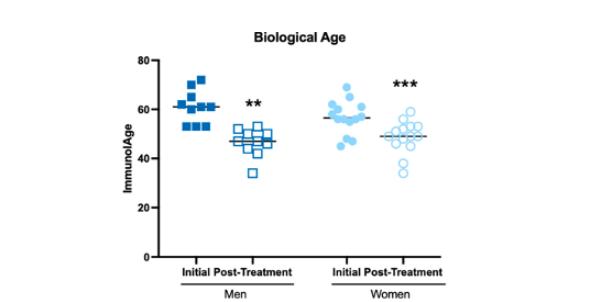A Spanish study found that probiotics combined with vitamin D can reverse biological age by more than 10 years, improve immune function, and reduce inflammation and oxidative stress.
The study has some limitations such as small sample size and lack of control group. A high-fiber diet also benefits gut health.
The composition of our gut bacteria plays an important role in the way we age and the way our immune system behaves.
Introducing beneficial gut bacteria – probiotics – into our digestive tracts can improve our immune system and even slow down the aging of our bodies.
As recently published in Biomolecules, Spanish scientists have found that combining vitamin D, which plays a crucial role in immune function, with a mixture of three probiotic strains can reverse biological age by more than 10 years and improve immune function.
These findings suggest that probiotics in combination with vitamin D could reverse aging by restoring our immune system.
Probiotics and vitamin D reverse biological aging
Our biological age can be thought of as the age of our cells, organs, and bodies.
It is different from our actual age – the number of years we have lived.
While some people have a biological age lower than their chronological age, others may have a biological age higher than their chronological age, indicating that they are aging rapidly.
To determine the physiological age of the participants, the Spanish researchers used several biological measures, including one that assessed the health of the immune system.
For example, the researchers measured the activity of natural killer cells (white blood cells that help fight disease).
They found that participants who took probiotics and vitamin D had higher natural killer cell activity.
Using measures such as natural killer cell activity, the researchers determined the biological age of each participant before and after taking the probiotic and vitamin D combination.
The combination consists of three probiotic strains (bifidobacterium animalis, Lactobacillus reuteri, and Lactobacillus plantarum) and 40 IU of vitamin D taken daily for 2 months.
The results showed that, on average, participants’ biological age decreased by 11 years after taking the probiotic and vitamin D combination.
It is worth noting that before taking the probiotic and vitamin D combination, the participants’ biological age (~58 years) was already higher than their chronological age (~48 years).

In addition to immune system function, the researchers evaluated two major potential drivers of cellular aging: inflammation and oxidative stress.
Overall, their results showed that the probiotic and vitamin D combination reduced inflammation and oxidative stress.
These findings suggest that boosting the immune system with probiotics and vitamin D could slow aging by reducing inflammation and oxidative stress.
Research limitation
The limitations of the study are rooted in the limitations of pilot studies in general, the most obvious of which is the number of participants.
The study included 10 men and 14 women aged between 30 and 60.
In general, a small sample size like this leads to statistical errors that could otherwise be avoided with more participants.
Interestingly, the error line not shown in any of the charts in this publication.
The effects of probiotic and vitamin D combinations may differ in different age groups.
For example, the combination may have a greater impact on a 60-year-old than a 30-year-old.
This kind of information cannot resolved with such a small sample size.
Larger studies with a narrower age range may help determine which age is best to start taking probiotics and vitamin D to reverse biological age.
Another limitation is the lack of a control group.
Without a placebo group, it is difficult to determine whether probiotics and vitamin D play a causal role in reversing biological age and improving immune function.
For example, such as people taking probiotics and vitamin D at the time of participating in the study may be eating healthier foods, which may improve immune function and shorten biological age.
The placebo group would control for such unforeseen variables.
Overall, the study supports the idea that maintaining a healthy gut microbiome can improve health.
Whether vitamin D is necessary needs further study.
While probiotics can promote a healthier gut microbiome, so can a high-fiber diet.
High-fiber foods include whole grains, fruits, vegetables, legumes, seeds, and nuts.




